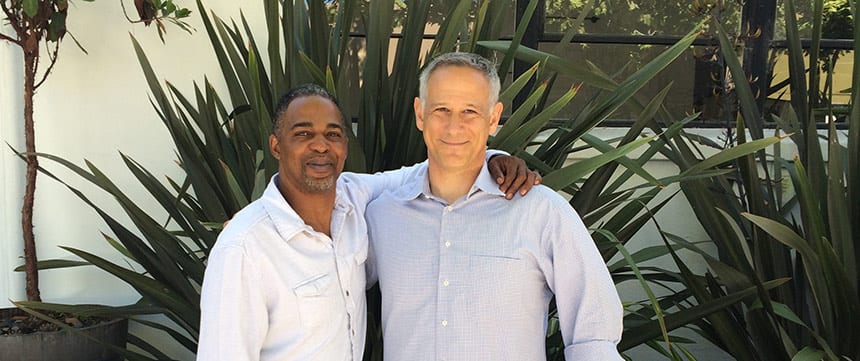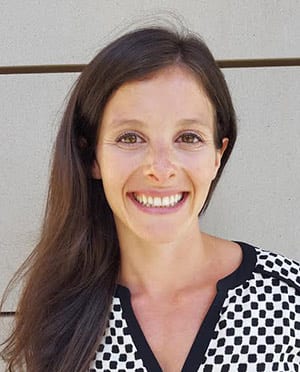
By Andrew Cohen
The idea of one person making a real difference in our big and complex world can feel quaint sometimes. Yet Jon Eldan ’02 has done just that on behalf of people released from prison for crimes they did not commit.
Last year, Eldan founded After Innocence, a nonprofit that helps exonerated former inmates rebuild their lives. Over the past quarter century, more than 1,800 people were released after being wrongfully convicted. While the media usually portrays this as a happy ending, the reality is anything but: Exonerees rarely receive meaningful compensation for their unjust incarceration, or much useful support. As a result, they often struggle to re-enter society.
“Exonerees have paid a horrific price for our system’s errors,” Eldan said. “Most of them emerge traumatized, broke, and lack housing or sufficient job skills. In most cases, we just turn our backs and leave them to suffer the consequences of wrongful conviction for the rest of their lives.”
Eldan became inspired to do something after seeing the 2005 documentary “After Innocence,” which chronicles the lives of seven exonerees and their myriad struggles after being released. He began contacting a few exonerees, learning about their post-release legal problems and recruiting lawyers—usually by cold-calling—to offer pro bono representation.
As the number of exonerations grew, it became increasingly clear to Eldan that “no one was even trying to reach the vast majority of these people to provide serious, rigorous help.” With the enactment of the Affordable Care Act, a prime opportunity to fill that void emerged.
“There was considerable confusion among people who’d never had health coverage before,” Eldan said. “I got myself up to speed in the summer of 2014 so I could counsel anyone in the country on what coverage they were eligible for—whether through an insurer or a government program. I walk them through the sign-up process so they can make good use of the benefits.”
Two years later, he has assisted more than 300 exonerees in 33 states through After Innocence. The organization coordinates social, health, and legal services for them in their own communities, documents their experiences and pushes for legal reform to help them gain fair compensation.
If his high-profile advisory board is any indication, Eldan’s work has clearly impressed. Members include Berkeley Law alums Barry Scheck ’74 (co-founder of The Innocence Project) and Samuel Gross ’73 (University of Michigan Law professor and National Registry of Exonerations co-founder), Bryan Stevenson (executive director of the Equal Justice Initiative) and best-selling authors Dave Eggers and Scott Turow.
“Exonerees have terrible problems reentering society, often after decades in prison, and with almost nobody to help them,” Gross said. “In most states, they get even less help from the government than released prisoners who are guilty. After Innocence has taken on this problem more effectively than any organization.”
Help where it’s needed most
On October 13, 1997, an intruder broke into a woman’s Illinois home in the middle of the night and stabbed her 10-year old son to death. Although the woman, referred to hereafter as Jane (she asked that her name not be used in this article), described the intruder in detail, she became the focus of a three-year police investigation after no sign of forced entry was found. In October 2000, a special prosecutor—appointed after the elected State’s Attorney declined to press charges, citing a lack of evidence—indicted her on capital murder charges.
Having exhausted her life savings on private counsel, Jane sought to appoint two capital defense lawyers as Supreme Court reforms required two qualified attorneys to defend anyone facing the death penalty. But prosecutors then announced that they no longer sought the death penalty, preventing her from receiving that benefit. Lacking the funds to fully investigate her innocence, Jane—defended by a single public defender against three opposing prosecutors—was convicted in March 2002 and sentenced to 65 years in prison.
Upon hearing details of the crime, a defense investigator noted that they mirrored crimes committed by a confessed child serial killer, Tommy Lynn Sells. Soon after Jane was sentenced, ABC’s “20/20” aired her story. An author who had written about Sells saw the program and relayed the information to Sells—who provided details only the killer would know. After the book was published detailing his confession, an investigation began to corroborate it.
In June 2006, Jane was finally found not guilty and received a certificate of innocence from the State of Illinois. But as the media glare faded, her suffering did not. A Ph.D. candidate in Educational Psychology when she was arrested, Jane never got to finish her dissertation. She did obtain compensation for her wrongful conviction and incarceration, but it diminished quickly amid having to move more than once and paying back people who had helped. Jane also grappled with Post Traumatic Stress Disorder from her son’s death and her time in prison and went through a divorce, further jeopardizing her financial stability.
“To have a huge time gap with no employment, especially in the information age where anyone looking at you for a position knows your background—thanks, Google—you become handicapped,” Jane said. “I’ve tried unbelievably hard, but am struggling beyond words. I even tried driving a truck, but they won’t take me because of the meds I have to take. Exonerated former prisoners never return to their previous life. It is forever gone.”
Eldan, however, gives Jane hope that she can gradually form a new life. He helps her navigate health insurance decisions, something she calls “a big issue for me because I’m on several medications, which creates a big expense.” In addition to providing healthcare advice, Eldan offers a much-needed sounding board.
“Anytime I’ve needed to speak to Jon, he’s right there,” Jane said. “He never has made me feel unimportant, or like speaking with me was a bother. On the contrary, he’s made it seem like something he wanted to do and that he truly cared. I feel forgotten by so many people, and embarrassed to tell them how much I’m struggling—about how I feel like I’m failing.
“With Jon, I can just tell him. He helps me think about how I can try to troubleshoot or face what I need to. I don’t expect him to solve my problems. But it helps just not to feel so alone with them. He tells me I’m doing a lot right, and that gives me some more energy to keep trying.”
In addition to assisting individual exonerees, Eldan pushes for systemic reform. Twenty states currently have no compensation statutes to benefit people wrongfully convicted, and Eldan said major flaws mar the statutes in half the states that do. “The money is absurdly low or the access to it is very limited,” he lamented.
Missouri provides compensation only if a prisoner’s release was based on DNA evidence—even though such evidence does not exist in about 90 percent of criminal cases. In Maine and Maryland, a pardon from the governor is needed to obtain compensation. Eldan has testified in California and Washington in favor of better exoneree compensation laws, and is using what he learns from working with exonerres nationwide to develop evidence-based reforms.
“We need to raise public awareness about how we fail these people a second time,” he said.
Another barrier deterring state legislatures to act: volume. Because the number of exonerees is relatively small on a statewide scale, and those affected are spread across jurisdictions, “it’s not a big policy priority for most legislators,” Eldan said.

To help After Innocence accelerate its momentum—on a micro level with individual exonerees and on a macro level with legislation—Eldan is seeking funding to bolster his organization’s resources. He also returned to Berkeley Law recently to talk with students who may want to help.
In December, Congress passed a law that excludes any payments exonerees receive through lawsuits and statues from federally taxable income. The law also provides for reimbursement of any income taxes paid on those sums in the past—but only if claims are submitted by the end of this year. “The opportunity is there, but won’t mean much unless exonerees know about it and have the help they need to file a claim by the deadline,” Eldan said. “So I’m recruiting law students to help do that, and to work on other projects that benefit exonerees.”
One of those students is Marina Henri ’18, who attended a talk by Eldan at the school last spring, presented by the Berkeley Journal of Criminal Law. Prior to law school, she worked with a forensic psychiatrist in New York who evaluated defendants and testified as an expert in court. One case dealt with a man who had been incarcerated for many years for a murder he did not commit.
“When he got out, he was overwhelmed by the changes that had taken place—something as small as motion-sensored faucets amazed him,” Henri said. “There are so many levels of injustice for these individuals. It’s shocking that our system doesn’t do more to help.”
She bemoans the “inconsistent statutes across states” and “insufficient number of organizations” providing services needed for exonerees to successfully re-enter society. “That’s why I’m excited for students to get involved with After Innocence,” Henri said. “I hope we can help Jon expand the scope of his work, and I think we have a lot to learn from him.”
Eldan freely admits that “being put on hold by healthcare administrators or listening to them read mind-numbing disclaimers is far from glamorous.” The satisfaction derived from the end results, however, fuels his tireless efforts.
“Helping people see a doctor for the first time in years or finding an attorney to get them past legal or bureaucratic problems—that’s very gratifying,” he said. “It’s the best work I’ve ever done.”